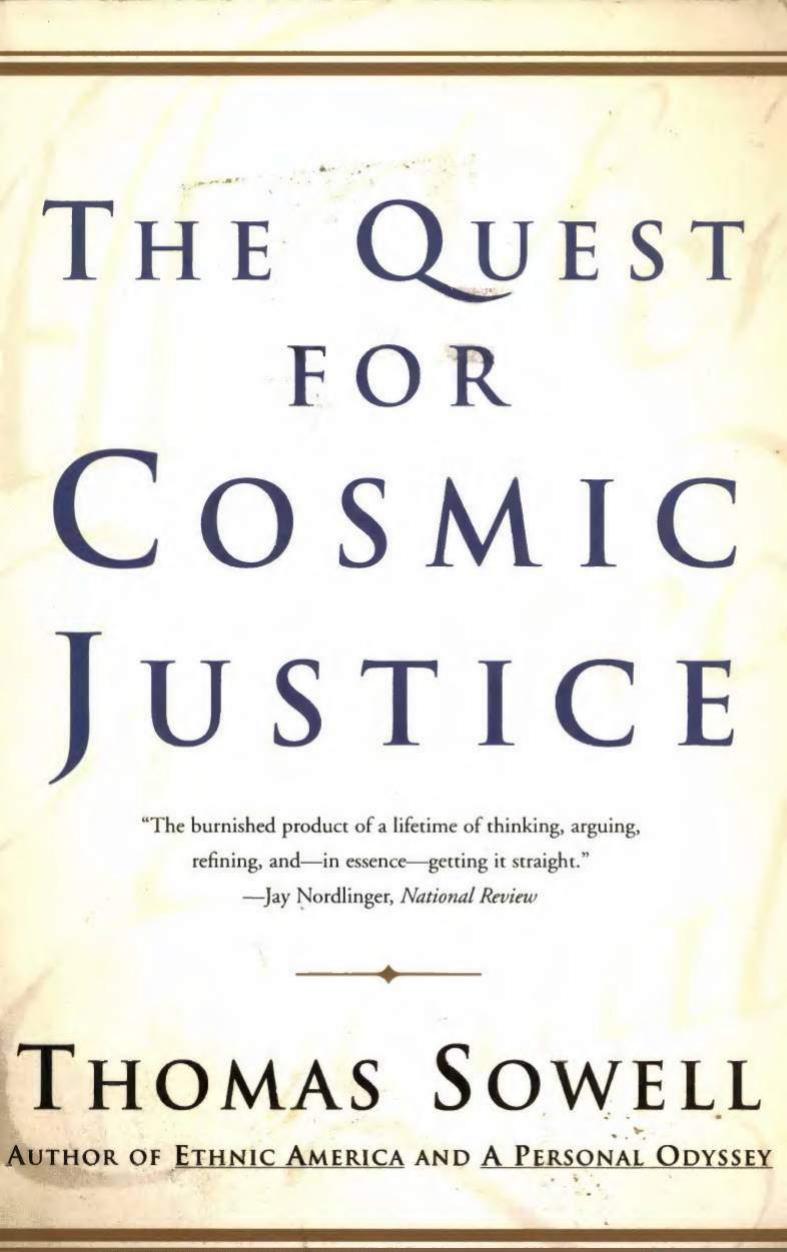The Quest for Cosmic Justice by Thomas Sowell

Author:Thomas Sowell
Language: eng
Format: epub, mobi, pdf
Tags: Social Justice/Law
Publisher: Free Press
Published: 2001-09-16T04:00:00+00:00
The Road to World War II
During the period between the two world wars, the terms of the competition between deterrence theories and disarmament theories were very uneven within the Western democracies. The latter vision was clearly in the ascendancy, both in theory and in practice.While the policies and statements of British Prime Minister Neville Chamberlain epitomized this conciliatory approach in the years that led up to World War II, that vision was pervasive in Britain before he ever achieved that office and it was a political force to be reckoned with in the United States and in other Western democracies.
Accordingly, a whole series of international disarmament agreements and mutual security conferences and agreements marked the two decades between the world wars. As in other contexts, the actual specifics of the disarmament agreements received remarkably little critical scrutiny by the morally anointed visionaries, who welcomed these treaties’ symbolism and their presumed psychological efficacy in relieving international tensions. For example, one of the earliest of these disarmament pacts, the Washington Naval Agreement of 1922, inhibited the growth of British and American navies but presented no practical barrier to the growth of Japan’s navy, since the permissible limits on Japan were no less than Japan’s current capacity to build warships—and, after the point was reached when the treaty limits would have become a practical barrier, Japan simply ignored the agreement, as Nazi Germany would later ignore a similar naval treaty with Great Britain.18
The inherent asymmetry of disarmament treaties between democratic and despotic governments—violations by the latter being far less constrained by public opinion or even public knowledge—were glided over by disarmament advocates.
The Washington Naval Agreement was followed by a series of much-heralded international conferences at Locarno (1925) and Lausanne (1932), among other places, spawning such euphoric phrases as “the spirit of Locarno” and declarations that the Lausanne conference had “saved Europe” and opened “a new era” for the world.19 The same euphoria would later greet Neville Chamberlain’s famous pronouncement after the Munich conference of 1938 that there was now “peace in our time.”
In the vision of the disarmament advocates, armaments themselves are the enemy. “Away with rifles, machine guns, and cannon!” cried France’s foreign minister, Aristide Briand,20 co-author of the Kellogg-Briand Pact of 1928 renouncing war. Bertrand Russell in 1936 declared, “disarmament and complete pacifism is indisputably the wisest policy” and urged “the gradual disbanding of the British army, navy and air force.”21 This was not an isolated individual opinion but one echoed in Parliament. British Labour Party leader Clement Attlee declared, “We on our side are for total disarmament because we are realists.”22 While the British government did not disarm, its expenditures on its military forces, which had declined from the late 1920s to the early 1930s, rose much less than those of Nazi Germany in the years leading up to the outbreak of the Second World War in 1939.
There was a similar pattern in the United States, where the American army had less than a quarter of a million men and was only the sixteenth largest army in the world, behind the armies of Greece and Portugal.
Download
The Quest for Cosmic Justice by Thomas Sowell.mobi
The Quest for Cosmic Justice by Thomas Sowell.pdf
This site does not store any files on its server. We only index and link to content provided by other sites. Please contact the content providers to delete copyright contents if any and email us, we'll remove relevant links or contents immediately.
| Anthropology | Archaeology |
| Philosophy | Politics & Government |
| Social Sciences | Sociology |
| Women's Studies |
The remains of the day by Kazuo Ishiguro(7550)
Tools of Titans by Timothy Ferriss(6945)
The Black Swan by Nassim Nicholas Taleb(6190)
Inner Engineering: A Yogi's Guide to Joy by Sadhguru(5893)
Giovanni's Room by James Baldwin(5877)
The Way of Zen by Alan W. Watts(5798)
The Six Wives Of Henry VIII (WOMEN IN HISTORY) by Fraser Antonia(4789)
The Power of Now: A Guide to Spiritual Enlightenment by Eckhart Tolle(4752)
Astrophysics for People in a Hurry by Neil DeGrasse Tyson(4618)
Asking the Right Questions: A Guide to Critical Thinking by M. Neil Browne & Stuart M. Keeley(4573)
12 Rules for Life by Jordan B. Peterson(3733)
The Ethical Slut by Janet W. Hardy(3501)
Skin in the Game by Nassim Nicholas Taleb(3459)
Housekeeping by Marilynne Robinson(3401)
The Art of Happiness by The Dalai Lama(3382)
Double Down (Diary of a Wimpy Kid Book 11) by Jeff Kinney(3272)
Skin in the Game: Hidden Asymmetries in Daily Life by Nassim Nicholas Taleb(3264)
Walking by Henry David Thoreau(3234)
12 Rules for Life: An Antidote to Chaos by Jordan B. Peterson(3199)
